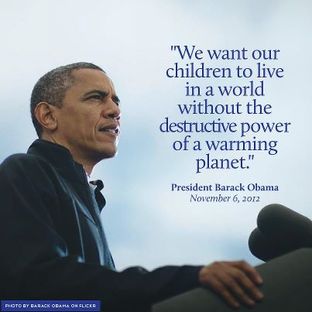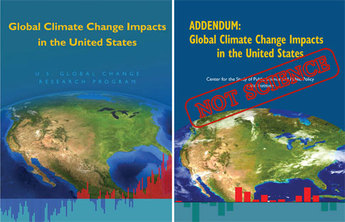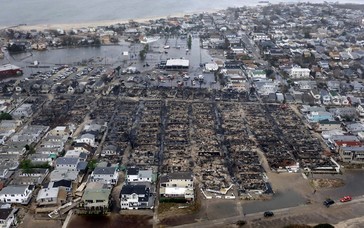Izzy Braithwaite  Image courtesy of tcktcktck He may not have achieved much on the climate front in his first term in office, but unlike Mitt Romney, Obama does at least seem to understand the extent of the threat posed by climate change. And - although constrained by the Senate and political will on the ground - he is likely to make more progress on emissions reductions or at least have a better chance of it than Romney. But at the same time, PwC's recent report argues that we are on course for a catastrophic 6C rise by 2100 without urgent measures, and finds that we need deep reductions in carbon intensity of 5.1% per year to 2050 - over six times greater than the 0.8 per cent average annual cuts achieved since 2000 - to avoid dangerous climate change. Such cuts will be a real challenge for even the most committed nations and the US - whether under Romn. And all the while, fossil fuel companies such as ExxonMobil are funding pseudoscience that will help to keep the public in a state of doubt and confusion for some years longer so their profits aren't compromised. The libertarian US Cato Institut based in Washington, DC, recently published its new report, Addendum: Global Climate Change Impacts in the United States - and it is designed to look just like the U.S. government’s official 2009 National Climate Assessment:  This was presented to Congress in 2009 as the federal government's best single evaluation of the science and potential impacts of climate change. Eleven authors of the original government report wrote a recent letter protesting what they called the “deceptive and misleading” Cato report: “The Cato report is in no way an addendum to our 2009 report. It is not an update, explanation, or supplement by the authors of the original report. Rather, it is a completely separate document lacking rigorous scientific analysis and review.” The Union of Concerned Scientists' 2007 report, Smoke, Mirrors, and Hot Air, detailed ExxonMobil’s campaign to use front groups to fund misinformation about climate change. They documented that Michaels was affiliated with no fewer than eleven groups funded by ExxonMobil. Two of the six-member author team on this new Cato report were also highlighted in their 2007 report - Robert Balling was affiliated with no fewer than five “front groups” funded by ExxonMobil. See also DeSmogBlog for other great pieces of investigative journalism on how vested interests have clouded awareness of climate science and impacts - we need to know what we're up against, as they have plenty of money and for a number of the fossil fuel companies it's certainly not matched by their scruples.
0 Comments
2/11/2012 Just after Hurricane Sandy, a new report shows that North America has experienced the largest increases in weather-related economic loss eventsRead NowIzzy Braithwaite  As the US starts to pick up the pieces after the recent battering by Hurricane Sandy, many commentators have been discussing its relationship with climate change. Somehow, for the first time since 1984, climate change didn’t come up in any of the three American election debates, whilst Romney's effectively stated his intention to step up where he perceives Obama's failed - and become ''Mr. Oil or Mr. Gas or Mr. Coal'' - or more likely all three. So it comes as no surprise that the NY Mayor Michael Bloomberg has now come out against Romney's position and endorsed Obama on the basis of his environmental track record. Ok, so he may not have achieved much - but he sure stands a better chance of curbing carbon than Romney, who a few months ago got a 30-second applause for using climate change as a punchline. Of course, it is never possible to put single events down to climate change - but this new report released recently by the insurance group Munich Re about long term trends shows that shows that North America has been most affected by weather-related extreme events in recent decades (terms of economic losses - in general, far more lives are lost in poorer regions, due to lower adaptive capacity), and that climate change is part of the reason: ''For the period concerned – 1980 to 2011 – the overall loss burden from weather catastrophes was US $1060bn (in 2011 values).The insured losses amounted to US$ 510bn, and some 30,000 people lost their lives due to weather catastrophes in North America during this time frame.
... Among many other risk insights the study now provides new evidence for the emerging impact of climate change. For thunderstorm-related losses the analysis reveals increasing volatility and a significant long-term upward trend in the normalized figures over the last 40 years. These figures have been adjusted to account for factors such as increasing values, population growth and inflation. A detailed analysis of the time series indicates that the observed changes closely match the pattern of change in meteorological conditions necessary for the formation of large thunderstorm cells. Thus it is quite probable that changing climate conditions are the drivers. The climatic changes detected are in line with the modelled changes due to human-made climate change''. The relationship between climate and hurricane formation is complex: hurricanes aren't caused by climate change as such - the IPCC recently concluded in its SREX report that there is ‘low confidence’ in an observed long-term (40 years or more) increase in tropical cyclone activity – but there is good evidence that such storms are made stronger by its other effects: rising average sea and air temperatures due to climate change mean more moisture in the atmosphere resulting in heavier rain and climate change also drives rising sea levels which result in increased risk of storm surges. For every 1°C that the temperature of the air increases, it can hold 7% more moisture - increasing the potential for flooding. Moreover, Sandy's coincided with an extra-high tide, which increases the threat even further, and flooding has started even before the hurricane has reached. Yet in fact the impacts of natural disasters are some of the easiest health impacts of climate change to quantify. Determining the role of climate change in promoting the spread and (re)emergence of infectious diseases is dramatically more complex. In turn, investigation of how climate change is likely to affect food and water security or - further down the line, economic stability or conflict – is even more fraught with difficulties. The causal chain for such effects is so much more multi-dimensional, depending on so many variables, and the effects less visible - but they could potentially have much bigger effects on health, at least in the long term, than direct impacts of natural disasters. Here we can think of climate change, to some extent as with its effect on hurricanes, as a threat multiplier - and Hurricane Sandy is a call to action. Link to press release about the report: http://www.munichre.com/en/media_relations/press_releases/2012/2012_10_17_press_release.aspx |
Details
Archives
February 2019
Tags
All
|
 RSS Feed
RSS Feed
